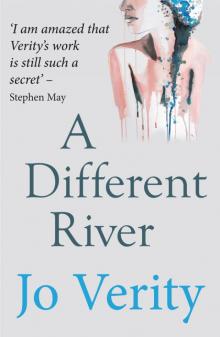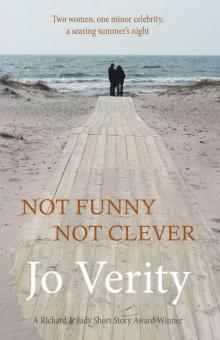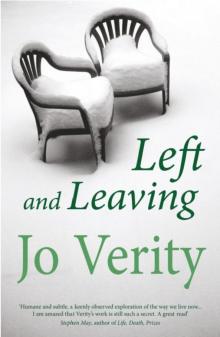A Different River Read online
Page 2
‘So tell me about you,’ he said. ‘Tell me about Miriam Siskin.’
And maybe because he had an open face, or because he’d shown an interest, or simply because he’d called her by her name, everything came tumbling out. Sam’s betrayal. The loss of her home and her job. The crushing banality that currently defined her life. (Not the bit about Sam’s ashes – no one knew about that.)
‘Sorry,’ she said when she’d finished. ‘I don’t generally bare my soul to strangers.’
‘Oh I do,’ he said.
‘Really?’
‘Strangers are impartial. They have no stake in your soul.’
She laughed. ‘Sounds Dracula-esque.’
‘Look,’ he said, ‘you mustn’t get demoralised. Eight months isn’t long. And you’ve had a heckuva lot to deal with. Don’t despair. You’ll hit on the answer.’
‘You can’t be sure of that,’ she said.
‘I can. I’m a fully paid-up clairvoyant.’ He nodded towards her book. ‘Good book?’
‘It took a while to get into but I’m enjoying it,’ she said.
They talked books, Callum doing his best to persuade her that graphic novels were ‘literature’ and that Shakespeare, were he around today, would have taken to Twitter ‘like a swan to the Avon’. It was light-hearted nonsense. Fun. It was a while since she’d been treated as a person in her own right, rather than an adjunct to someone else.
They’d moved on to films when a jangling came from Callum’s jacket. ‘Excuse me,’ he said, taking out his phone.
He turned away from her and, although she couldn’t see his face, the way he was massaging his forehead indicated that the news wasn’t good.
‘Something wrong?’ she said when he’d finished.
‘Not wrong, exactly. Bloody inconvenient. My life model has buggered off to Spain.’
‘Oh dear. Did she not—’
‘He.’
‘Did he not give you a hint?’ she said, the image of a fig-leafed youth flashing through her mind.
He shook his head. ‘Viktor’s always been flaky. I don’t blame him. It’s not the most stimulating job. And the pay’s lousy. It would have been nice to have a bit more notice, though.’ He glanced at his watch. ‘I’d best be off. See if I can call in a few favours.’
‘Well thanks again for the coffee. And the chat. It’s been very pleasant.’
‘It has.’ He took a card from his satchel and handed it to her. ‘This is me. Let me know how things pan out.’ Then, as if he could read her mind, he added ‘I’m not just saying that.’
‘I will,’ she said. ‘And good luck finding a replacement model.’
‘Have you seen Rosa’s trainers?’ Naomi said as they passed on the landing. ‘Oh, and how was the film?’
‘I didn’t go,’ Miriam said. ‘At least I went but when I got there I didn’t fancy it. Mmm. Trainers. I think I saw them in the downstairs cloakroom.’
Miriam chose this moment to come (almost) clean as in the hurly burly there would be no time for a post-mortem. School mornings were a series of crises. Missing games kit, unpractised spellings, misplaced reading books. Naomi hunting for her phone or a pair of un-snagged tights. By the time they next met, something else would have overtaken her daughter’s irritation at her missed night out.
Miriam had slept fitfully. The conversation with Callum Robertson, although light-hearted, had resurrected a tranche of disturbing issues. Brought them bubbling to the surface where they were impossible to ignore. Eight months would soon become a year, then two, and Miriam Siskin would be permanently defined by her tripartite role – daughter, mother and grandmother.
After the house had been sold and Sam’s gambling debts cleared, she’d been left with a small sum of money. It might buy her a tiny flat if she weren’t too particular where she lived but it wouldn’t cover her living costs. She didn’t need to earn a fortune, simply enough to pay her way. Sixty-one wasn’t the ideal age to embark on a new career and she examined her options for the umpteenth time, hoping there was a possibility she’d overlooked.
Returning to teaching – standing in front of judgemental, apathetic teenagers, enthusing about George Eliot or the romantic poets – was out of the question.
Librarian. She could be a librarian. She had a degree in literature and knew how to put things in alphabetical order. But libraries – those that hadn’t been closed – were now ‘Learning Hubs’. She guessed that involved advising people with ‘issues’ and helping them acquire IT skills. She was neither qualified nor wished to do either of those.
Did The Lady – if it still existed – have its ‘situations vacant’ section? Acting as paid companion to an old dear couldn’t be that difficult could it? Although on second thoughts…
What else? M&S? ‘Sorry to keep you waiting.’ ‘D’you want the hanger?’ Oh, God.
Last week she’d spotted an ad in the paper inviting applications for MI5. Curious and disbelieving, she’d visited the website where a link took her to their ‘investigative challenge’. Over the years, she’d absorbed enough John le Carré to know which of the multiple choices to tick and had done well enough for them (or an algorithm) to suggest she might be ‘investigative officer material’.
So. Her future lay somewhere between espionage and selling underwear, which covered pretty much everything.
Her day progressed without incident or interruption. No one called to invite her to go swimming or offered her a theatre visit or suggested a trip to the garden centre – commonplace events before she’d become Miriam, the gullible widow who’d caved in under the strain of it. Miriam the failure.
By the time she was standing in the playground, isolated in the midst of a chattering crowd, she was feeling exceedingly sorry for herself.
3
When she answered the door she found David on the doorstep. ‘Miriam. Lovely to see you.’ He leaned forward to kiss her and she caught a whiff of cigarettes beneath his cologne. ‘How are you?’
David Garrett was a gentle, thoughtful man. Miriam had always got on well with him and she missed his being around. Naomi seemed less bothered than she did by their separation, and the children had accepted the set-up as if seeing their father at weekends were normal. (She did wonder whether Rosa’s outbursts were a result of his absence – although the child had been angry from the day she was born.)
‘I’m well,’ she said. ‘You’re off to visit your parents, I believe.’
His looked tired and she noticed he was missing a button from his jacket.
‘It’s easier for us to go to them,’ he said. ‘There’s space for the kids to run around. And Mum loves having a houseful.’
She didn’t know the ins and outs of it but Naomi had mentioned that he was living in a small flat on the far side of town. From what she’d gleaned from the children, there was no garden and it was ‘miles and miles’ to the park.
‘Where is everyone?’ he said.
‘Upstairs. Arguing about what they should bring.’
He glanced towards the stairs and, lowering his voice, said, ‘It’s a great comfort knowing that you’re here, looking out for them.’
David might like the idea that she was keeping an eye on them but it wasn’t fair to expect her to dedicate her life to mopping up the mistakes of others.
‘You do know that this is a temporary arrangement?’ she said. ‘I’ll be moving as soon as I get something sorted out.’ It sounded brusque and, to be truthful, slightly delusional but it was essential to keep reminding everyone – particularly herself – that she wouldn’t be living here forever.
She still clung to the hope that Naomi and David would get back together. Their marriage had seemed rock solid, the two of them such good friends. When, without warning, they’d announced their parting, she and Sam had spent hours trawling the past, looking for evidence of cracks. When they’d asked Naomi, she’d trotted out vague, generic reasons. ‘It isn’t working’ and ‘people change’, and the more loaded ‘only two
people know what goes on in a marriage’, but, to Miriam’s way of thinking, nothing to justify throwing in the towel. In the light of what followed a matter of months later, it was embarrassing to recall how she and Sam had offered to mediate – as if their marriage set the gold standard for honesty, trust and tolerance.
David hovered on the doorstep and she wondered whether to invite him in. Offer him a coffee. Give him and Naomi a few minutes together. They needed to keep talking – stay connected – if there were to be any hope.
He must have guessed what was running through her mind. ‘It’s okay, Miriam.’
He squeezed her hand and she noted the trace of yellow-brown stain between index and middle finger. What a shame. He’d been so pleased with himself when he’d kicked the habit.
Before she had a chance to say any more, he shouted, ‘C’mon you two. Let’s get this show on the road.’
Rosa and Max came hurtling down the stairs and, scooping them into his arms, he pulled them close. ‘Hi. Have you had a lovely week? What have you been up to?’
The children began gabbling, voices growing louder as they tried to outdo each other.
Naomi appeared with two backpacks. ‘Rosa, Max. Your things.’
‘Hi.’ There was caution in David’s smile. ‘How are you?’
‘Frazzled. Tired.’ Her folded arms signalled keep your distance and, for the umpteenth time, Miriam wondered what could have happened to cause and sustain this rift.
‘Well, enjoy your quiet weekend.’ There was the hint of a dig in his remark, as if he sensed Naomi was planning quite the opposite. ‘Right, kids. Coats on and we’ll be on our way. What time d’you want them back, Mum?’
‘Not too late. They’ll need baths and hair washes.’
‘Okay.’
‘Check they clean their teeth, David. And not too much TV. Oh, and seatbelts. Be sure they—’
‘I have a vested interest in these children too,’ he said.
‘Have a lovely time,’ Miriam said. ‘And please remember me to your parents, David.’
‘Will do.’
He herded his children down the path, both of them tugging at his jacket, instantly switching allegiance from one parent to the other, employing a child’s inborn tactic for self-preservation.
The car pulled away and Naomi, miraculously energised, hurried upstairs to get ready for her day out. But Miriam stayed in the kitchen, remembering a time when they’d been a proper family. Before David left, and Sam had the bloody cheek to kill himself. When she’d been an interesting person. How readily they’d taken it all for granted – the wonderful normality and nurturing ease of it. What a mess they’d made of everything.
Her father consulted his pocket watch. ‘You’re early. What happened to all that stuff you had to do?’
‘I did it,’ she said, ‘but I can go away and come back later if you like.’
Her father cupped her cheeks and peered at her face. ‘You look pale.’
‘I’ve been driving for two hours, Dad. A cuppa and I’ll be right as rain.’ She shrugged off her coat. ‘Where’s Mum?’
‘Changing. Let’s get the kettle on.’
The washing up had been done and everything tidied away but the kitchen still smelled of fish and cauliflower. A joint of beef in its frosted wrapping stood on a platter on the worktop. From her mother’s description, she’d pictured a quarter of an ox but it probably weighed less than a kilo.
Her father filled the kettle and took three mugs from the shelf. He dropped one tea bag in the pot, considered, then added a second. When she was a child, there had been ‘men’s work’ and ‘women’s work’ and she’d never got used to seeing him perform these domestic duties.
‘I’m glad I’ve got you on your own,’ he said.
‘Oh, dear.’
He laid his hand on her arm. ‘You must stop assuming that all news is bad news. You’re going to make yourself ill again.’
She waited, allowing him to concentrate on pouring boiling water into the tea pot, his skinny wrist shaking with the weight of the kettle.
‘You have to let it stand for a couple of minutes,’ he said, a mantra to the process. ‘Come.’
She followed him into the dining room now used only on special occasions. Close her eyes and she would smell the Sabbath candles, the sulphurous coal smouldering in the tiled grate. He took a key from his pocket and unlocked the drawer of the dainty desk in the alcove at the side of the chimney breast.
‘This is intriguing,’ she said.
He took a bulky manila envelope from the drawer and handed it to her. ‘Here.’
She held the envelope, its top folded over and secured with several rubber bands. ‘What is it?’ she said, knowing yet not knowing exactly.
‘Nothing. Eight thousand pounds.’
She laughed. ‘Dad, you can’t—’
‘A bond matured. What are we going to do with it? Go jet-setting? You’ll get it when we die so you might as well have it now. When you need it.’
‘But—’
‘Tsk, tsk, tsk. Not another word.’ He pointed to the envelope. ‘Put it away before your mother comes.’
Her parents had adored Sam. They’d been instrumental in her meeting him. In her marrying him. From the word go they’d treated him as their second son. Their first son after that final bust-up with Danny. When Sam died, and the truth came out, they’d been knocked sideways. On her previous visit she’d noted that Sam’s photograph had been relegated to the back of the collection on the dresser, obscured by the rest of the family.
‘I’m okay, Dad. Honestly.’
‘Miriam, you have no income.’
‘I’ll get a job. I’m feeling much, much better.’
‘That’s good to know.’ He held her with a steady gaze. ‘Put it somewhere safe. It’ll be there if you need it.’
‘Lionel?’ Her mother was coming downstairs. ‘Is she here? Why didn’t you call me?’
‘We’re in the dining room, Freda,’ her father called, flapping his hands to indicate that she should conceal the envelope.
Her mother looked more insubstantial each time Miriam saw her. Her clothes – even her shoes – looked a size too big. Only arthritic knuckles prevented her rings from slipping off her fingers. Her skin had the translucence of a newborn. Rather than making her look healthy, the artless dabs of rouge on her cheeks gave her the appearance of a feverish doll.
‘Hello, Mum.’
‘You look peaky, dear,’ her mother said.
And they went over it again – her early arrival, the tiring drive – ending up back in the kitchen making a fresh pot of tea.
Miriam dumped her holdall on the chair and switched on the lamp. This room had been hers from the age of thirteen, an acknowledgement of her coming of age. The yellow and indigo scheme she’d thought so avant-garde had been over-painted several times with serviceable ‘neutrals’. Her collection of gonks and her Joni Mitchell wall were long gone but the circular mirror and the Anglepoise lamp remained. And the desk at which she’d done her homework and written love letters to her schoolboy sweetheart still stood there, alongside the armchair where she’d curled up reading The Group and The Female Eunuch, making sense of neither until she’d plucked up the nerve to explore her own body. The elation, misery and uncertainty of adolescence, all lurked here, primed, ready to explode and pepper her with memories.
After her father had retired she’d encouraged them to look for somewhere smaller, where they’d worry less about heating bills and the garden and the awkward stairs. But they’d always come up with reasons to stay put. She’d lived here for her first twenty-one years; he’d retired twenty-one years ago. The symmetry felt significant. Beginnings and endings, perhaps.
She took the envelope from her bag and emptied it onto the bed. The cash was in eight bundles, each held with a red rubber band. Her father picked up these bands – the postman’s discards – when he went for his morning newspaper and took delight in his growing cache which sat
in a jam jar on the window sill in the hall. Eight thousand pounds. In twenty-pound notes. What did these pieces of paper represent? A decent second-hand car. One of those fancy-pants chronometer thingies that Leonardo DiCaprio advertised. More tempting, a ticket on the Trans-Siberian Railway. Or maybe enough to keep her solvent for a year or two if she were prudent. (Sam would have doubtless put it on a horse and lost the lot.)
Of course she couldn’t take the money. Not because it would leave her parents short. It wouldn’t. Her father’s pensions, coupled with a lifetime’s habit of collecting rubber bands and the like, ensured their dwindling needs were covered. And there was no escaping the facts. Her parents wouldn’t live forever and, unless they went on a spending spree of epic proportions, she would eventually inherit a substantial sum. This spacious house near an ‘outstanding’ state school – she had no idea what it might sell for. One thing was certain, it would be snapped up before the estate agent had time to put up a board. But it wasn’t good to drift along as she was, pocketing advances on her ‘great expectations’. It wasn’t good to become the family charity case which threatened to go hand-in-hand with being the family carer.
She returned the bundles of notes to the envelope. Her father had ordered her to put it somewhere safe. Under the mattress? On top of the wardrobe? In the end she left it on the desk, challenging fate to deliver a bolt of fire or a burglar.

 Bells
Bells A Different River
A Different River Sweets From Morocco
Sweets From Morocco Not Funny Not Clever
Not Funny Not Clever Left and Leaving
Left and Leaving Everything in the Garden
Everything in the Garden